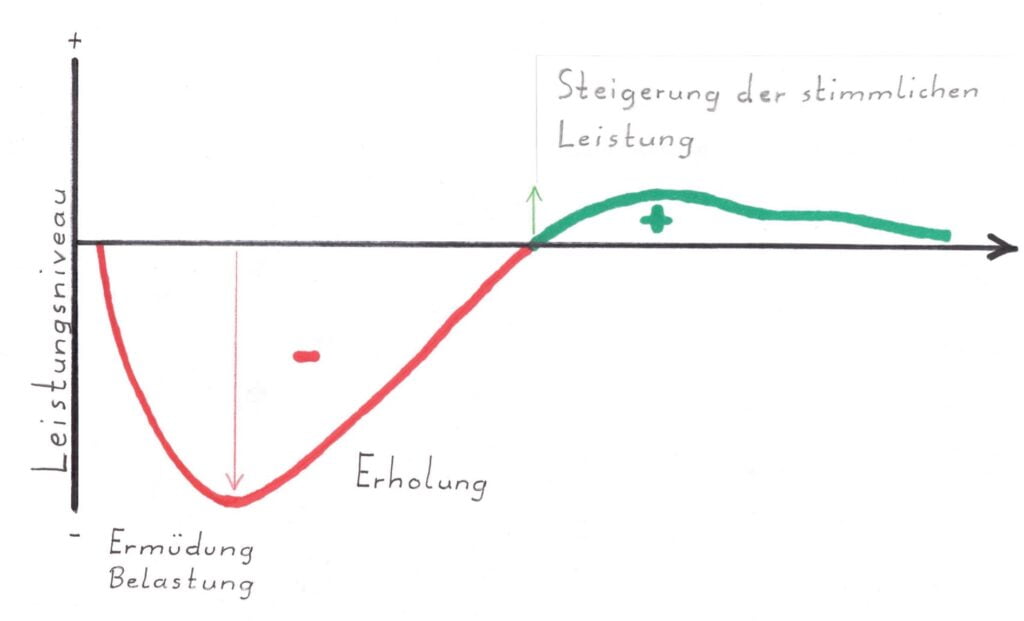Would you do a deep knee bend with 60 kg on your shoulders straight after getting up? What a question, you might think, of course not! From an early age we have learned that you have to warm up your muscles before doing a heavy exercise. And yet many people don't do this with their singing voice. Whether in rehearsals or during PerformancesThey just sing away, up to high registers that demand maximum performance from their vocal muscles. And they are surprised when their voice breaks or they become prematurely hoarse.
Competitive athletes, dancers and instrumentalists spend a lot of time building muscle strength, good technique and neuromuscular memory for their movement sequences. As singers, we can learn a lot from them - especially from the principles and systematics of their training.
Also the Structure of an exercise session we can learn from them. Each training is divided into three phases.
Warm up and stretch
The aim of warming up is to improve blood circulation to the muscles to be targeted, to mobilise the muscle and connective tissue and to prevent injuries. For example:
- General stretching, straightening of the body, Breathing exercises (expansion of the chest and lower back).
- Warming up the voice muscles: smaller and larger glissandi upwards in the head voice to Stretch the vocal cords.
- Stretching and loosening the tongue and jaw muscles
Training the voice through strengthening and coordination exercises
The aim of the strengthening and coordination exercises is a balanced load of the main muscle groups of the vocal apparatus and neuromuscular protection of the technique:
- Breath and support
- Vocal approach (placement of the voice, working with Twang sounds)
- Resonance (creating space for vowels, vocalises, involvement of the body)
- Consonants (strengthening of the soft palate, tongue and lip muscles, with special emphasis on the independence of the tongue from the lower jaw)
- Train different consonant-vowel combinations, taking into account the generation of the best possible resonance.
- Twang (Strengthening of the voice, especially in the middle and high register)
- Belting (Twang in connection with calling, from the middle position, secured by propping).
- Song work (Apply the singing technique)
Relax and Cool Down
A vocal cool down promotes the regeneration of the voice and enables singers to sing more effortlessly the next day:
- Vocal Fry (guns)
- Yawn
Breaks between exercise sessions and regeneration
Muscles do not grow during, but only after the end of exercise in the regeneration phase. The new training stimulus should only be set when the muscles (vocal folds), connective tissue and cartilage (larynx and stellate cartilage) have had enough time to recover and strengthen. As a rule, one day is sufficient as a regeneration break. If you sing a lot and already have a well-developed, trained voice, you do not need to take a day off, but you should make sure to train different vocal functions in regular rotation.

Repetition and continuity is one of the most important rules for a healthy and long-lasting voice. Only regular and lasting training stabilises and perpetuates the body's adaptations. In this way we strengthen our muscle memory and stabilise neuromuscular pathways for permanently retrievable vocal high performance.
Training the voice after illness
Be aware that the Mucous membranes and the vocal apparatus After a cold, it takes longer for the muscles to recover than the rest of the body. When your general condition has improved so that you feel healthy again, your vocal muscles need at least one week longer to be able to work again.
Start your training with easy exercises such as bubbling, tongue trills or humming. Do not train for more than 15 minutes at the beginning and avoid using your voice in high registers. Increase the amount of training you do each time, in small steps, and stop immediately when you feel vocal fatigue. Drink more water than usual.
I wish you a lot of fun with your voice training. In my Online singing courses you will find everything you need.
If you have any questions, feel free to send me an email,
under: info@singasong-behappy.de
Yours, Bernadette






